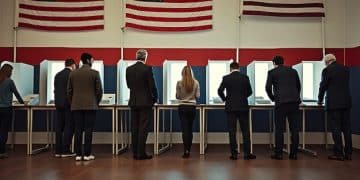US Diplomatic Boycott of 2026 Olympics: Impact on Global Relations

How Will the US Diplomatic Boycott of the 2026 Winter Olympics Impact International Relations? A potential boycott would strain diplomatic ties, influence alliances, and possibly lead to retaliatory measures, affecting both political and economic relationships on a global scale.
The question of How Will the US Diplomatic Boycott of the 2026 Winter Olympics Impact International Relations? is complex, involving geopolitics, human rights, and athletic competition. Concerns over various international issues could prompt such a boycott, leading to significant repercussions.
Understanding the Potential US Diplomatic Boycott
A diplomatic boycott involves refraining from sending high-level government officials to an event, such as the Olympics. This action would serve as a symbolic protest.
Such boycotts aren’t new, often arising from disagreements about human rights, political actions, or breaches of international law. Considering how will the US diplomatic boycott of the 2026 Winter Olympics impact International Relations?, we must examine the historical context and potential triggers.

Historical Precedents for Olympic Boycotts
Throughout history, several nations have boycotted the Olympics, signaling disapproval on the international stage. Each case offers insights how will the US diplomatic boycott of the 2026 Winter Olympics impact International Relations?
- 1980 Moscow Olympics: The US led a boycott to protest the Soviet invasion of Afghanistan, fracturing the Olympic movement and intensifying Cold War tensions.
- 1984 Los Angeles Olympics: The Soviet Union and its allies retaliated, boycotting the games citing security concerns and commercialism in the US.
- Various Apartheid-Era Boycotts: Numerous African nations boycotted the Olympics due to South Africa’s apartheid policies, highlighting the role of sports in addressing racial injustice.
These boycotts demonstrate the powerful role of the Olympics as a diplomatic tool, with the potential to shape international perceptions and alliances.
In conclusion, the US diplomatic boycott of the 2026 Winter Olympics will likely have a ripple effect, similar to the historical events where nations boycotted Olympic Games to express dissent against policies or actions taken by host nations.
The Geopolitical Landscape Surrounding the 2026 Olympics
The geopolitical context of the 2026 Winter Olympics is crucial in understanding potential boycott triggers. Several global issues might prompt the US to consider diplomatic action.
Understanding how will the US diplomatic boycott of the 2026 Winter Olympics impact International Relations? will hinge on evaluating the current geopolitical climate, including ongoing conflicts, human rights concerns, and treaty obligations.
Key Geopolitical Factors
Diverse factors influence the decision to stage a diplomatic boycott, ranging from regional conflicts to broader alignments. Here’s how.
- Human Rights Concerns: The US government and various human rights organizations closely monitor human rights records of host nations, and ongoing rights violations are a major consideration.
- International Conflicts: Active military conflicts or territorial disputes involving other nations directly influence decisions, reflecting a need to project moral authority on the world stage.
- Trade and Economic Policies: Unfair trade practices or economic policies that disadvantage the US can also instigate diplomatic actions, using the Olympics as a venue for broader political messaging.
Therefore, a US boycott of the 2026 Winter Olympics would carry significant meaning, based on the state of international politics surrounding human rights infringements and economic disagreements.

In essence, geopolitical conditions form the backdrop against which a diplomatic boycott is considered. These factors create a complex decision-making environment for the US government.
Potential Impacts on US-Host Nation Relations
A US diplomatic boycott could strain relations with the host nation and impact diplomatic dialogue. The severity depends on the existing relationship and the reasons for the boycott.
Considering how will the US diplomatic boycott of the 2026 Winter Olympics impact International Relations?, these repercussions could entail formal protests, revised trade relationships, and decreased cooperation on shared issues.
Possible Diplomatic Repercussions
A boycott can lead to various diplomatic consequences, influencing the overall dynamics between nations. Here are some examples:
The host nation may view the boycott as disrespectful and meddling in its sovereign affairs possibly causing a breakdown in diplomatic negotiations which would make resolving conflicts even more difficult.
- Formal Protests: The host nation would likely lodge a formal protest, viewing the boycott as an affront to national prestige and a challenge to sovereignty.
- Strained Dialogue: Diplomatic dialogue could be severely hampered, complicating efforts to resolve ongoing disputes or address mutual concerns.
- Reduced Cooperation: Cooperation on various international issues, like climate change, counterterrorism, and trade, may diminish as trust erodes.
The long-term consequences on diplomatic relations can be substantial. Normal interactions may be suspended, and negotiating new agreements will be even more difficult.
In summary, the implications of a US diplomatic boycott on relations with the host nation are considerable. Rebuilding trust and restoring diplomacy requires persistent effort.
Influence on Alliances and International Solidarity
The ripple effects of a US diplomatic boycott include how it affects alliances and global solidarity. Allies may feel compelled to follow suit, while others could remain neutral.
As we consider how will the US diplomatic boycott of the 2026 Winter Olympics impact International Relations?, the effects on alliances will be significant, either reinforcing shared values or highlighting differences in foreign policy.
Impact on Global Alliances
The decision by allies either to join or not to join a boycott presents a test for coalitions and their dedication to widespread principles.
- Coalition Unity: US allies may face pressure to join the boycott, testing the unity and resolve of existing coalitions. A coordinated response strengthens the message, but divergent paths can expose rifts.
- Neutral Nations: Some nations may choose neutrality, balancing their relationships with both the US and the host country. This stance can lead to complex diplomatic maneuvers.
- Global Perception: The nature of responses from various nations would influence how the international community views the situation, affecting the US’s leadership and moral standing on the global stage.
The dynamics of international collaboration can change markedly based on how alliances are maintained. A boycott serves as both a judgment and a catalyst. The need to uphold shared aims is carefully weighed against the necessity for autonomy in foreign affairs.
In short, the global consequences of a possible US diplomatic boycott of the 2026 Winter Olympics involve intricate alliance dynamics and the continuous evaluation of international solidarity.
Economic Consequences and Trade Relations
Economic implications can be far-reaching in the wake of a US diplomatic boycott. Trade relationships with host countries are particularly vulnerable.
When we analyze how will the US diplomatic boycott of the 2026 Winter Olympics impact International Relations?, we must explore potential economic retaliations, shifts in global trade alliances, and the overall effect on investments and market access.
Economic Aftermath of the Boycott
A diplomatic boycott often sets in motion diverse economic consequences, influencing commercial relations, investments and market dynamics.
The host nation might target American enterprises with trade obstacles and regulations, causing greater frictions in overseas commerce.
- Trade Restrictions: The host nation may impose trade restrictions on US goods and services, affecting businesses across various sectors. Retaliatory tariffs could trigger a trade war.
- Investment Climate: Foreign investments could decline as firms reconsider their exposure to the host nation, impacting job creation and economic growth.
- Market Access: US companies might face limited access to the host nation’s markets, reducing their potential revenues and hindering global development efforts.
Long-term economic prospects might be challenged during periods marked by suspicion and distrust. Reestablishing confidence requires effort.
The US diplomatic boycott of the 2026 Winter Olympics will likely have consequences to the country’s trade relations, with the host nation and with potential economic growth due to companies reconsidering their partnerships.
Long-Term Implications for International Sports and Diplomacy
A US boycott may redefine use of sports in diplomacy, potentially encouraging future boycotts or alternative venues for international dialogue.
To understand how will the US diplomatic boycott of the 2026 Winter Olympics impact International Relations?, we must look at how such steps could alter views about sports’ role in diplomacy, perhaps causing new strategies for worldwide dialogue and cooperation.
Future of Sports Diplomacy
A decision by the US to diplomatically boycott the Olympics carries profound implications for the future of sports diplomacy, affecting how nations engage and negotiate through athletic events.
The usage of the Olympics as a platform for political messages would increase, possibly diminishing its standing as an occasion for intercultural exchange and goodwill.
- Increased Politicization: Sports may become increasingly politicized, with nations using athletic events, including the Olympics, as platforms to express dissent or signal approval.
- Alternative Venues: Nations could seek alternative venues for international dialogue, bypassing the Olympics in favor of forums deemed neutral ground.
- Legacy of Boycotts: Future generations may view boycotts as a legitimate tool in international relations, normalizing the practice and eroding the Olympic spirit of unity.
The stability and integrity of international sporting events will be at risk in these times of high geopolitical risk. Stakeholders will have to work together to safeguard the ideals of sport as a means of unification.
In closing, any analysis of how will the US diplomatic boycott of the 2026 Winter Olympics impact International Relations?, needs to consider potential structural shifts in international sports and diplomatic engagement.
| Key Point | Brief Description |
|---|---|
| 🤝 Diplomatic Relations | A boycott strains ties, leading to formal protests and reduced cooperation. |
| 🌍 International Alliances | Allies may face pressure to join, impacting coalition unity. |
| 💼 Economic Impact | Potential for trade restrictions and reduced market access. |
| 🏅 Sports Diplomacy | Impacts use of sports to boost diplomatic relations. |
Frequently Asked Questions
▼
A diplomatic boycott involves a country refraining from sending official government representatives to an international event, such as the Olympics, to protest certain policies or actions of the host country.
▼
The US might consider a diplomatic boycott due to concerns over human rights violations, political conflicts, or trade disputes with the host nation, aiming to express disapproval on the global stage.
▼
A boycott can strain diplomatic ties, lead to formal protests, and reduce cooperation on shared international issues, potentially impacting long-term relations between the US and host country.
▼
Some allies may join the boycott to show solidarity, while others stay neutral, affecting coalition unity and leading to complex diplomatic maneuvers within international alliances.
▼
The boycott may result in trade restrictions, reduced investment, and limited market access for US companies, which can trigger a trade war and affect economic growth in both nations.
Conclusion
In summary, the US diplomatic boycott of the 2026 Winter Olympics will have complex effects on international relations. These range from straining diplomatic ties and testing alliances, to creating potential economic consequences and reshaping sports diplomacy. The ultimate impact depends heavily on how involved countries and international organizations respond.





